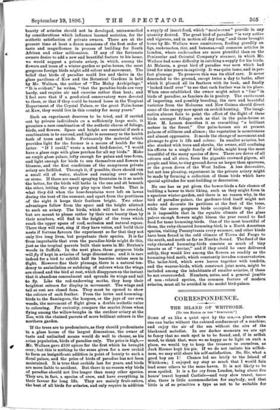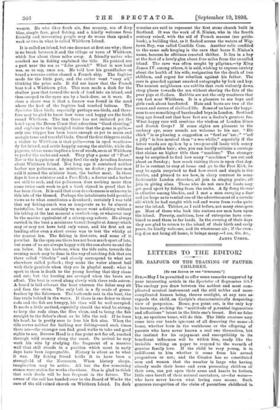CORRESPONDENCE.
THE ISLAND OF WHITHORN.
[To THE EDMOR OF THE " Sracr►ros."] SOME of us like a quiet spot by the sea,—a place where one can bathe without the cabined confinement of a machine, and enjoy the air of the sea without the airs of the blackened melodist. In our darker moments we are apt to fancy that no such spot is to be found, and, if in selfish mood, to think that, were we so happy as to light on such a place, we would try to keep the treasure to ourselves, as Jack Horner kept his pie. If we do not imitate his selfish- ness, we may still share his self-satisfaction. So, Sir, what a good boy am I! Chance led me lately to the Island of Whithorn; I enjoyed my stay so much that I would fain lead some others to the same haven. It is not likely to be soon spoiled. It is a far cry from London, being about five hours' travel beyond Carlisle—and very slow travel, too— also, there is little accommodation for anybody, and that little is of so primitive a type as not to be suitable for SOME of us like a quiet spot by the sea,—a place where one can bathe without the cabined confinement of a machine, and enjoy the air of the sea without the airs of the blackened melodist. In our darker moments we are apt to fancy that no such spot is to be found, and, if in selfish mood, to think that, were we so happy as to light on such a place, we would try to keep the treasure to ourselves, as Jack Horner kept his pie. If we do not imitate his selfish- ness, we may still share his self-satisfaction. So, Sir, what a good boy am I! Chance led me lately to the Island of Whithorn; I enjoyed my stay so much that I would fain lead some others to the same haven. It is not likely to be soon spoiled. It is a far cry from London, being about five hours' travel beyond Carlisle—and very slow travel, too— also, there is little accommodation for anybody, and that little is of so primitive a type as not to be suitable for
women. He who likes fresh air, fine scenery, sea of deep blue, simple fare, good fishing, and a kindly welcome from friendly and interesting people may do worse than spend a week or two in what is called Whitborn Island.
It is called an island, but one does not at first see why ; there is no break between it and the village or town of Whithorn, which lies about three miles away. A friendly native who coached me in fishing explained the title. He pointed out a part near the sea as "false ground." What is now land was, so to say, once sea. He told how his grandfather on board a revenue-cutter chased a French ship. The fugitive made for the little port, and the cutter went "easy all," thinking the prize safe. It did not know that the French boat had a Wbithorn pilot. This man made a dash for the shallow pass that turned the neck of land into an island, and thus escaped to the open sea by a back-door, as it were. So close a shave was it that a furrow was found in the sand where the keel of the fugitive had touched bottom. The Spectator likes birds, especially perhaps sea-birds, and there- fore may be glad to know how tame and happy are the birds round Whithorn. The inn there has not imitated yet the hotel upon the Devon Coast that advertises " Good shooting," and explains to the inveigled visitor that the game is gulls,— only one tripper has been brave enough as yet to maim and mangle tame and trustful birds. One of the first things to strike a visitor to Whithorn is that gulls—even in open weather— fly far inland, and settle happily among the stubble, while the pigeons, whose name implies a love of woods, seem at Whithorn to prefer the rocks and sand. They play a game of "Post." Nor is the happiness of flying fowl the only Arcadian feature about Whithorn Island. Not long ago it contained neither barber nor policeman, no minister, no doctor ; profane men said it missed the minister least, the barber most. In these days it has a minister and a Free Kirk ; a doctor and a barber are still to seek, and the policeman does nothing more than come twice each week to get a book signed in proof that he has been there. It is said that even drunkenness is unknown in this isle of the blessed. Perhaps the inhabitants hold peculiar views as to what constitutes a drunkard; certainly I was told that my fishing-coach was so temperate as to be almost a teetotaller, but as certainly we never went a-fishing without his taking at the last moment a rowlock-cup, or whatever may be the marine equivalent of a stirrup-cup ashore. He always carried in the boat a miniature barrel (bought at Amoy) which may or may not have held only water, and his first act on landing after even a short cruise was to test the whisky at the nearest inn. The fishing is first-rate, and some of it peculiar. In the open sea there has not been much sport of late, bat some of us are always happy with the sun above us and the sea below. In the harbour, when the tide suits, towards the evening much may be done in the way of catching fish that are there called " bloekin " and closely correspond to what are elsewhere called pollack ; they make the water almost boil with their gambols when they are in playful mood: what is sport to them is death to the young herring that they chase and eat ; but the herring are avenged when the boats are afloat. The boat is rowed along slowly with three rods astern. A board is laid athwart the boat whereon the fisher may sit and face the stern. The only trait is a fly made of goose- feather by the fishermen. The butt-ends rest in the boat, the line trails behind in the water. If there is one fisher to three rods and the fish are hungry, his time will be well occupied. It needs a little method, especially should the wind be strong, to keep the rods clear, the flies clean, and to bring the fish straight to the fisher's chest as he lifts the rod. If he loses his head, he is pretty sure to lose his fish also. When the tide serves neither for bathing nor fishing—and such times there are—the stranger can find good walks to take and good sights to see. Burrow Head is a fine point not far off, reached through wild scenery along the coast. On arrival he may work his wits by studying the fragment of a massive wall that still stands in a position which must in early days have been impregnable. History is silent as to what it was. My fihing friend holds it to have been a stronghold of the Norsemen. When history sleeps, imagination may be active. All but the few remaining stones were stolen for works elsewhere. One is glad to think that such deeds will be less frequent in the future. The owner of the soil has handed over to the Board of Works the care of the old ruined church on Whithorn Island, Its dark remains are said to represent the first stone church built in Scotland. It was the work of S. Ninian, who in the fourth century raised, with the aid of French masons (see guide- book), a building that, as it flashed across the waters of Wig- town Bay, was called Candida Casa. Another relic confided to the same safe keeping is the cave that bears S. Ninian's name, because he ofttimes resorted thither. It lies in a bay at the foot of a lovely glen about four miles from the so-called island. The cave was often sought by pilgrims,—by King James IV. among others, it is said, wishing to express anxiety about the health of his wife, resignation for the death of two children, and regret for rebellion against his father. The cave is guarded against unasked autographs by lock and key.. The nearest neighbours are rabbits that rush violently down, steep places towards the sea without sharing the fate of the- poor pigs at Gadara. Rabbits are not the only creatures that run fast near Whithorn. It is a pleasure to see boys and, girls rush about barefooted. Hats and boots are two of the- crazes and curses of civilised life. Some of us have the happi- ness to see something of bareheaded boys in London. Scotland. long ago found out that bare feet are a doctor's greatest foe. What happy race will combine the wisdom of London Bluea. and Scotch Greys P If some sights are pleasant to the cockney eye, some sounds are welcome to his ear. l•Bite chick " is as pleasing a suggestion as "fowl an' am ;" "'ark a jiffy " is less musical than " a wee whilie," especially if the latter words are spoken by a two-year-old lassie with sunny face and golden hair ; also, you can hardly criticise a carriage.- that claims no higher title than " machine." The stranger- may be surprised to find how many "machines" are out and about on Sunday ; how much visiting there is upon that day. If he is content to stay at home and go to the Free Kirk, he may be again surprised to find how short and simple is the- service, and pleased to see how, in sharp contrast to some- fashionable London churches, all join in singing praise, alb• join in giving alms. Those who do not care for boats may get good sport by fishing from the rocks. A fly flung thence] is effective among blockin, and I met a man carrying a fine' cod (so large as to remind one of the advertisement of a certain• oil) which he had caught with rod and worm from rocks qnite- near the island. Thither, as I said before, not many strangere go. Most of those who look like visitors are men born upon the island. Poverty, ambition, love of enterprise have com- bined to send them to far lands. In the evening of their days they are glad to return to the island of their birth and early years, its kindly welcome, and its wholesome air ; if the even, ing does not bring all home, it brings many.—I am, Sir, &a,.
JAMES -USHER,



































 Previous page
Previous page